Diversity
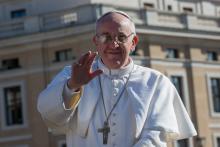
In his first official meeting with a Jewish delegation, Pope Francis on Monday reaffirmed the Catholic Church’s condemnation of anti-Semitism and vowed to further deepen Catholic-Jewish relations.
“Due to our common roots, a Christian cannot be anti-Semitic!” he told a delegation of the International Jewish Committee for Interreligious Consultations, the Vatican’s official partner for interfaith dialogue with the world’s Jews.
In his speech, Francis stated that the church condemns “hate, persecution, and all manifestations of antisemitism.”
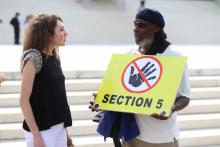
Today is a dark day in our nation’s history. In a 5-4 ruling, the Supreme Court ruled in the case of Shelby County, Alabama v. Holder that Section 4 of the Voting Rights Act is unconstitutional, rendering the 48-year-old legislation impotent to protect citizens from voter suppression. Section 4 lists the states that must obtain “preclearance” from the Department of Justice before instituting changes to their voter laws. In her dissenting opinion, Justice Ruth Bader Ginsburg, said: “Throwing out preclearance when it has worked and is continuing to work to stop discriminatory changes is like throwing away your umbrella in a rainstorm because you are not getting wet.”
Only 48 years ago, on March 7, 1965, men, women, and children absorbed blasts of water, bone-crushing blows from police batons, and profound humiliation as Selma, Ala., police dragged limp black bodies over concrete on the far side of the Edmund Pettus Bridge. They had assembled on that day, which came to be known as “Bloody Sunday,” to march from Selma to Montgomery in protest of voter suppression and intimidation that had plagued the entire South. Ten days later, President Lyndon B. Johnson sent the Voting Rights Act to Congress. The bill passed in the Senate on May 26 by a vote of 77 – 19 and passed in the House on July 9 of that year. President Johnson signed the Act into law with Dr. Martin Luther King, Rosa Parks, and others present on August 6.
Flash forward to Fall 2012. I launched a blog series called “Watch the Vote” because, as of August 2012, 30 states had introduced legislation or enacted laws to hinder voters’ access to voting over the previous year. The Fair Elections Legal Network crafted this map to chart the spread of legal voter suppression initiatives across the nation. Notice, Alabama is one of the states that has recently passed voter restriction law that has not been precleared by the Department of Justice. Its new law, requiring photo ID and proof of citizenship, was set to take effect in 2014 before the Supreme Court ruled last week that Arizona’s voter ID law, which Alabama used as a model for its own, is unconstitutional.

As I officiate at a family wedding in this charming coastal city, it seems to me the institution of marriage is alive and well — and in serious trouble.
The trouble isn’t out-in-the-open homosexuality, birth control, abortion, assertive women, or any of the right-wing alarms.
The trouble is poverty. The less affluent you are, the more likely you are to have a child without the benefit of a partner, at an age too young for effective parenting, and in chaotic living arrangements.
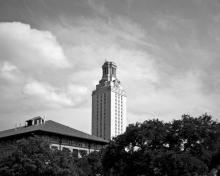
In a vote of 7-1 on Monday, the Supreme Court sent an affirmative action case, Fisher v. University of Texas, back to the lower court for a re-hearing, while reaffirming the benefits of diversity in institutions of higher learning and authorizing the continued use of race as one factor in admissions. By sending the case back to determine if the University of Texas could find no “available, workable race-neutral” alternatives available to them, Justice Ruth Bader Ginsberg explained the court did not issue a strong enough support for affirmative action. I agree. By virtue of our nation’s not-so-distant history, race simply is a factor that should be considered.
For nearly 250 years, blacks were bought and sold like cattle and carriages on auction blocks across America. When the Atlantic slave trade was outlawed in 1807, the U.S. bred slaves to reinforce the fundamental source of its wealth: free labor. When shackles fell from the wrists and legs of black men, women, and children — and the Reconstruction Era took hold — black families thrived and held public office. Then, for the next 80 years, thousands of white men in the South covered their faces with sheets, burned crosses, lynched 3,445 black men, women, and children, and instituted a web of laws that made it nearly impossible for blacks to vote, attain equal education, or own a home of much worth. At the same time in the North, blacks, Latinos, and Asians were redlined into urban ghettos where access to good housing, competitive education, adequate health care, effective law enforcement, and gainful employment was scarce.
When did this reign of terror against African-Americans end? The Civil Rights Act of 1964 and Voting Rights Act of 1965 outlawed so-called “Jim Crow” laws that had blocked blacks from voting and legally reinforced racial segregation. The acts laid the foundation for legal recourse against all manner of discrimination from that day to present.
Now consider this: We have made only two generations of progress after 17 generations of comprehensive, structural, systematized, and racialized oppression. And the effects of that oppression still haunt us today.
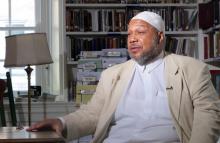
Imam Dayaiee Abdullah never knows how many people are going to show up for Friday prayers.
Some weeks, nearly a dozen men and women gather at a Quaker hall in northwest Washington, D.C., where they kneel on prayer rugs laid out to transform the room into a Muslim place of worship.
Other weeks, Abdullah, a convert to Islam, sits alone.

For more than a generation, the gay conversion organization known as Exodus International has been one of the most prominent Christian symbols of LGBT intolerance. They have practiced what is commonly called “reparative therapy” to supposedly remove the urges of same-sex attraction from those who seek to become straight. I have personally written at great length about the damage done by such religiously fueled zealotry, but never in my lifetime did I anticipate that the leader of this infamous anti-gay organization would concede as much to the public in the form of a confession.
What’s more, at their 38th annual convention, Exodus International’s director, Alan Chambers, announced plans to close the organization and cease its mission for good. You can read Mr. Chambers’ full of apology HERE, as well as the formal closure announcement HERE.
I’m not prone to emotional hyperbole, but I read these announcements and confessions with a nearly overwhelming admixture of shock, disbelief, compassion, and hope. I also try not to fill my blog posts with too much content from other sources, but this is one of those occasions when the original source material should be seen without adaptation. Following are several excerpts for Mr. Chambers’ open apology to the public, along with my thoughts:

For more than 100 years, Britain’s Girl Guides took an oath to “love God and serve the King/Queen.”
But on Wednesday the movement announced it would scrap its oath to God in an attempt to broaden its appeal and attract children from secular, nonbelieving families.
The controversial shake-up is seen by some as the biggest in the Girl Guides’ history.

The way fans reacted to Dolores Hart’s decision to become a cloistered nun, you might have thought the movie star had announced her intention to kill herself.
Even close friends and family could not fathom why this Grace Kelly look-alike, who gave Elvis his first on-screen kiss and had her pick of acting jobs, would stow herself away in a nunnery for the rest of her life.
As if to test her resolve in those weeks before she left Hollywood, Universal Studios offered her a role opposite Marlon Brando, a role she turned down shortly after she broke off her engagement to Don Robinson, a kind and handsome businessman who loved her intensely.

Amid calls to get more Muslims using the Internet, experts who have studied Muslims online caution that the virtual Islamic community can be a “double-edged sword.”
While the proliferation of Muslim websites provides a platform for a multitude of voices, Sahar Khamis, communication professor at the University of Maryland, College Park, said there is a shortage in the amount of rational, critical deliberation, and debate taking place online.
The Pew Forum on Religion & Public Life recently released a report suggesting that Muslims who use the Internet tend to have a more favorable view of Western movies, music, and television than their offline counterparts.
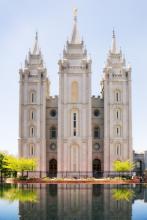
June 8, 1978, was a sacred, momentous event — a revelation — that catapulted Mormonism into a new era of global growth.
On that day, the Church of Jesus Christ of Latter-day Saints ended its ban on blacks in its priesthood, opening ordination to “all worthy male members,” including those of African descent.
“For me,” former church President Gordon B. Hinckley said on the day’s 10th anniversary, “it felt as if a conduit opened between the heavenly throne and the kneeling, pleading prophet of God who was joined by his brethren.”

On a recent Monday evening, a room inside Christ Community Church was transformed into a coffeehouse with fresh-brewed coffee, plenty of popped kettle corn and the thorny subject of racism on the table.
For an hour, about 20 people gathered around tables, shared personal experiences about racism, watched a short documentary and answered questions meant to stimulate conversation.
The event is called Lifetree Cafe, and it’s a new evangelical tool gaining popularity with churches reaching out to potential members.
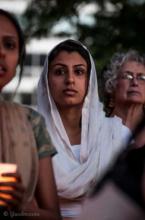
For Raed Jarrar, the FBI’s decision Wednesday to begin tracking hate crimes against Arabs is a battle won in a larger war.
“This is just one part of fixing the system, because unfortunately many hate crimes against Arab Americans have not been noticed,” said Jarrar, spokesman for the American-Arab Anti-Discrimination Committee.
In addition to its decision on tracking anti-Arab hate crimes, the FBI has agreed to track crimes against a number of religious groups it has never before tracked. The new categories include reporting crimes committed against Buddhists, Hindus, Sikhs, Mormons, Jehovah’s Witnesses, and Orthodox Christians.

With the release of their ninth annual report, members of the Hindu American Foundation are pushing policymakers to take action against international human rights violations directed at Hindus.
The four countries the report categorized as egregious violators — Afghanistan, Bangladesh, Malaysia, and Pakistan — are all Muslim-majority countries.
Samir Kalra, author of the report, titled Hindus in South Asia and the Diaspora: A Survey of Human Rights said the foundation included countries in which the plight of Hindus is largely overlooked. The impact of the report, he said, is twofold: It gives a voice to Hindu minorities and educates officials in the U.S. and worldwide.
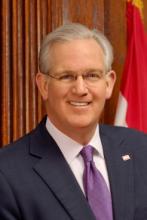
Missouri Gov. Jay Nixon has vetoed a bill that would have made his state the seventh in the nation to prohibit judges from considering Shariah, or Islamic law, and other “foreign laws” in their decisions.
But rather than citing the usual arguments about anti-Muslim discrimination and the freedom of religion, Nixon introduced a new argument against such legislation, asserting it would make it harder for Missouri families to adopt children from overseas.
Nixon said if state judges would not be able to consider foreign decrees that are sometimes required to finalize adoptions, adoptive families and children would be left stranded.
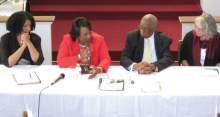
BERNICE KING watched as, one by one, the heads of denominations from across the nation bent down to sign the Christian Churches Together in the U.S.A. “Response to Dr. Martin Luther King Jr.’s ‘Letter from Birmingham Jail.’” Transfixed, King—Martin King’s daughter—sat in the first row of a church one block from Kelly Ingram Park, where 50 years before children had run scared, ravaged by German shepherds and fire hoses.
As they signed, the presidents of CCT’s five church “families” stepped to the podium. Each read his or her church family’s confession of complicity with the demons of racism and injustice during and since the civil rights era.
Fifty years ago, Martin Luther King Jr. sat behind bars in the Birmingham city jail and responded to criticism from eight local white clergy’s “Call for Unity” against outside agitators. King penned prophetic words in the margins of the newspaper that carried the white clergy’s call for “law and order and common sense.”
“Injustice anywhere is a threat to justice everywhere,” King explained. He recounted the failed attempts to negotiate with city officials hell-bent on living a “monologue rather than dialogue.” He clarified: “The purpose of our direct-action program is to create a situation so crisis-packed that it will inevitably open the door to negotiation.”
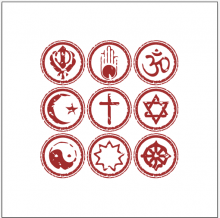
BECAUSE I'M A Jew in Bethlehem, Pa., also known as “Christmas City USA,” I spend December celebrating Jesus’ birth. Representations of other religions are largely absent, but with evergreen trees adorning lampposts, the nativity scene at city hall, and 6-foot-high electric Advent candles, Christmas here is both beautiful and unavoidable.
Given Christianity’s dominance in the United States, similar examples extend into other seasons and across the country. Christian holidays and Sunday receive scheduling deference, Christian worship options are varied and plentiful, and debates over public “religion” focus almost entirely on Christianity. In contrast, Jews use vacation days to observe holidays, Jewish religious communities are far fewer, and there is no movement advocating Jewish prayer in schools.
Even in interreligious settings intended to be neutral, Christianity retains primacy. Exchanges emphasize concepts in Christianity, such as belief and faith, and downplay the Jewish stress on action, behavior, and ritual. When interfaith interactions turn to biblical texts, they rely on Christian hermeneutical approaches such as using English translations without acknowledgment of their underlying Hebrew and eschewing the Jewish practice of viewing the Bible through subsequent commentaries. To me, these verses look discomfortingly naked when not swaddled with sages’ centuries-old wisdom, and Christian translations often conflict with how I understand the original language.

The decision by the Boy Scouts of America to accept openly gay Scouts has raised the question: Are atheists and other nonbelievers — the only remaining group BSA still bans — next?
No one is holding their breath, least of all Neil Polzin, an Eagle Scout who was fired from his job in 2009 as an aquatics director at a Boy Scout camp in San Diego after he admitted to being an atheist.
“I don’t see that happening, at least not in the immediate future,” Polzin said. “The focus has always been on the Scouts’ discrimination against gays and it seems atheists were always on a back burner or not discussed at all.”
But that doesn’t mean nonbelievers — atheists, humanists, and other nontheists — have abandoned their quest for inclusion. In the wake of the BSA’s May 23 vote that led to the inclusion of gay Scouts — but not gay scoutmasters — every major organization of nonbelievers has issued a statement condemning their continued exclusion.
A BSA official declined to comment, but issued a statement that said, in part, that since the organization had “just completed a lengthy review process, there are no plans for further review on this matter.”
The problem for atheists lies in an oath in which scouts promise to “do my duty to God and my country.” Some nonbelievers have suggested their sons change the word “God” to “good,” but the BSA has remained firm. Some atheist children have been asked to leave after years in Scouting when it was revealed that they did not believe in God.

Oklahoma is probably one of the tougher places to be a Muslim in America, but Muslims have stepped in to help with the cleanup of a massive tornado that killed 24 people.
“As Oklahomans, we’re part of this community, and our hearts just break for what happened,” said Adam Soltani, executive director of the Oklahoma chapter of the Council on American-Islamic Relations, one of several Muslim groups collecting donations.
“We want to show the compassion and mercy that Islam teaches us.”

Now that Boy Scout delegates have taken their long-awaited vote and permitted openly gay Scouts, will there be a mass exodus by religious groups?
It depends on who you ask.
The Assemblies of God is certain there will be.

While the consequences of social privilege are alarming for numerous reasons, we are reminded that such systematic inequalities are by no means unique to the current day and age. For example, during Jesus’ ministry he encountered a predominant culture that distributed a wide variety of elite benefits based upon gender, class, ethnicity, and other forms of false favoritism. However, one of the primary distinctions of Jesus’ life, which he continually modeled for his disciples, was a prophetic confrontation with unjust structures of social privilege.
As Jesus accompanied women, tax collectors, lepers, prostitutes, and others firmly placed on the underprivileged margins of society, he repeatedly sought the reversal of embedded discrimination and disadvantage. In doing so, not only did Jesus promote Good News of eternal life for after death, but he sought to “let the oppressed go free” (Luke 4:18) for the fullness of life after birth.
While Jesus continually endorsed the revolution of unjust social privilege, and although he taught his followers to do likewise in his name, the harsh reality is that privilege based on prejudice is profitable, which makes it difficult – if not impossible – for those in power to surrender voluntarily